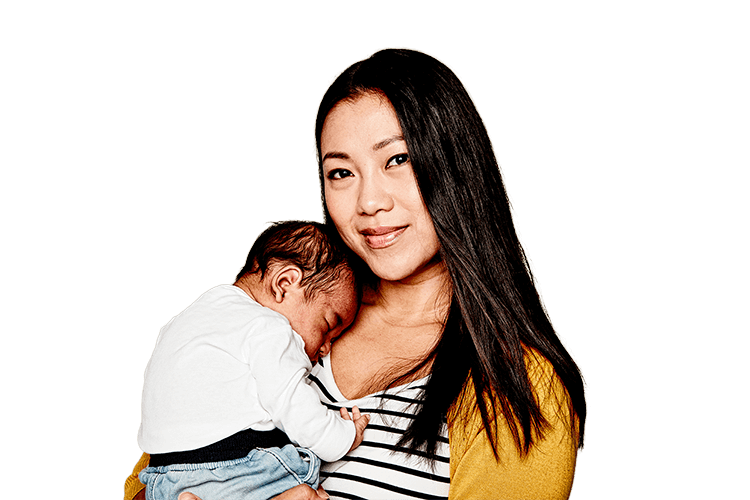In the first weeks and months after your baby arrives, your focus will be on recovering from the birth, as well as making sure your brand new baby has everything it needs. But as your body starts to feel a bit stronger and you get into a bit of a rhythm with your baby, it’s time to give some attention to yourself and your health.
After you’ve given birth, it’s likely you’ll still weigh more than before you conceived. The extra weight might be a combination of extra breast tissue, blood storage, an enlarged uterus and fat stores, as well as any extra weight you put on during pregnancy.

Nutrition and diet
We have differing nutritional needs at the various stages of life. After giving birth, and especially if you are breastfeeding, you will still need more calories than normal. Looking after a baby is hard work, and your body is under extra physical demands, including dealing with sleepless nights, so now is not the time to attempt a crash diet. The foods that you eat should be nutrient-rich, to give you the energy you need, and when it comes to losing weight, slow and steady will win the race. Set yourself realistic goals to lose just a little bit of weight each week, and always discuss this with your doctor first.
Avoid emotional eating
While snacking may have become a much more prominent part of the way you eat during pregnancy and after your baby arrives, it’s easy to find yourself grazing on snacks when you aren’t actually hungry. You may find you are eating in response to any number of different emotions such as anger, loneliness or anxiety. This is called emotional eating and it’s a sure-fire way to gain weight in the long term.
Jean Hailes dietitian Anna Waldron says, “The evening can be a time that people snack out of habit or in response to emotions such as feeling bored, stressed or tired. Being aware of this and developing some positive strategies may help address non-hungry eating.
“If you feel hungry in the evening ensure you are eating healthy meals over the day and prepare a healthy snack to have during the evening such as fruit with yoghurt.”
It’s also interesting to note that when you don’t get enough sleep you tend to crave sweet foods, which provide an energy boost. This is because of two hormones, ghrelin and leptin. Leptin tells your brain you are full and to stop eating. Ghrelin stimulates your appetite, making you want to eat more. If you haven’t had enough sleep this may effect these appetite hormones.
If you find you have a habit of snacking too much or overeating at meals, ask yourself: Am I hungry?
Before reaching for food, consider if you’re actually hungry. Waiting for five minutes before eating will help you recognise if you are hungry or just want to eat out of habit.
Get moving
Physical activity can make you feel great – it’s scientifically proven! When we exercise, our bodies release ‘feel good’ hormones called endorphins, which help reduce stress, boost your self esteem and help you get a good night’s sleep. Just 30 minutes of brisk walking each day will help you burn calories, reduce your risk of cardiovascular disease and help you get fit. Breaking this down to three 10-minute walks throughout the day may be more manageable.
After having your baby, visit your GP before embarking on any fitness regime. Discuss booking a follow-up appointment every three months to monitor your weight, blood pressure and your overall progress.
Here are three key habits to get you started:
- Stay positive. Focus on the achievements you’ve made already, including having made a beautiful baby! Set realistic goals, and don’t get too disappointed when you don’t see immediate change.
- Monitor. Focus on the type of foods you are eating. Stock up on fresh fruits, vegetables, lean meats and some dairy and wholegrains, and minimise the amount of processed food you have in the house. Keeping a food diary will also help you see patterns in your diet. Where possible, follow the current Australian dietary guidelines.
- Motivate. Try and do something active every day, even if it’s just pushing the pram to the shops and back again. As a new mother, getting outside will help your mind and body to heal and feel more healthy.
If you need some extra guidance or support, visit a nutritionist or dietitian to create a tailor-made eating plan for you.
Need a little extra support?
Health Concierge
Eligible members with hospital cover can now talk to a member of our Health Concierge team for advice and guidance on how to have a healthy pregnancy, at no extra cost on 1800 789 414.#
Got a health question? 24/7 Medibank nurse phone service
Members with hospital cover can chat to experienced and qualified nurses over the phone to discuss any health questions or concerns and get professional advice on what to do next. Our nurses are available on 1800 644 325~ for round-the-clock health advice.
Medibank Mental Health Phone Support
Members with Hospital cover can talk with a mental health professional over the phone in relation to any mental health or emotional concern, 24 hours a day 7 days a week by calling 1800 644 325.~
Looking for something else?
Visit Medibank Planning, Pregnancy and Parenting for a range of tools and advice to help you at every stage of your pregnancy journey.
Help the way you want it
Contact us
Call us on 134 190 to speak to a consultant. Alternatively, chat to us 24/7 online.
Self-service options
Login to MyMedibank or Download the MyMedibank App for self service options.
Find a specialist
Find a specialist or Member's choice hospital using our find a provider tool.

Things you should know
~ OSHC members should call the Student Health and Support Line on 1800 887 283.
# Health Concierge is available to all eligible Medibank members who hold hospital cover. Excludes Overseas Visitor Health Cover, Working Visa Health Cover and Overseas Student Health Cover (OSHC). Some referred services may involve out of pocket costs.
While we hope you find this information helpful, please note that it is general in nature. It is not health advice, and is not tailored to meet your individual health needs. You should always consult a trusted health professional before making decisions about your health care. While we have prepared the information carefully, we can’t guarantee that it is accurate, complete or up-to-date. And while we may mention goods or services provided by others, we aren’t specifically endorsing them and can’t accept responsibility for them. For these reasons we are unable to accept responsibility for any loss that may be sustained from acting on this information (subject to applicable consumer guarantees).